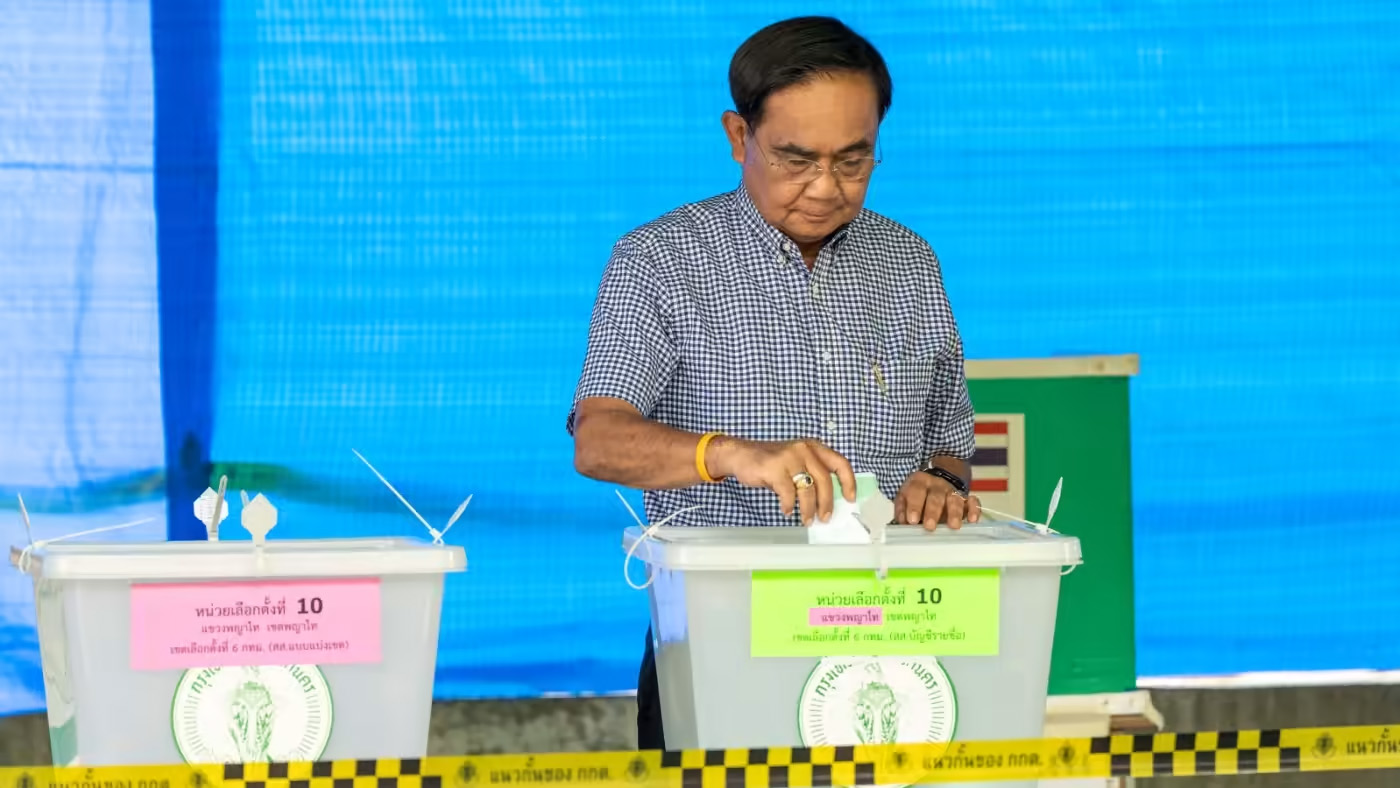
PRACHIN BURI, Thailand — Near a sprawling military camp in Prachin Buri, a small agricultural town two hours east of Bangkok, voters saw an opportunity during Sunday’s general elections to turn against the military generals who had ruled their lives for nearly a decade.
By early afternoon, Thais leaving the polling booths near the camp hinted at their support of nonmilitary parties in the election.
A 57-year-old voter voiced a commonly held view. “When we have the right to change, we should change,” she told Nikkei Asia. “I want to change the prime minister.”
But this was not an isolated snub against the United Thai Nation Party, headed by incumbent Prime Minister Prayuth Chan-ocha, and the Palang Pracharath Party, led by Deputy Prime Minister Prawit Wongsuwan. It was echoed by voters in the Dusit district of Bangkok and the city of Lopburi in central Thailand, the latter of which also houses a muscular military presence.
The rebuke against the military in its strongholds revealed the discontent that fueled the pro-democracy wave that swept through Thailand on Sunday, just the second election since the 2014 military coup led by Prayuth and Prawit, both generals.
The final count affirmed the marching orders the majority of voters gave the politically ambitious generals. The two pro-democracy opposition parties, Move Forward and Pheu Thai, collectively triumphed with an absolute mandate of 64% of the 39 million votes cast — a dramatic rise from the camp’s haul of nearly 40% during the 2019 elections.
This political windfall has enabled the youthful Move Forward Party to secure an unexpected 152 seats in the 500-member lower house. Move Forward is the successor to the pro-youth Future Forward Party, which was established ahead of the last general elections but subsequently dissolved in a controversial court ruling. The new party had the generals in its sights during the campaign with a progressive manifesto calling for sweeping reforms of the deeply entrenched military, Thailand’s most powerful political institution.
Seasoned observers are not surprised by the scale at which the center of political gravity has shifted away from the royalist-military camp. The two pro-military parties of Prayuth and Prawit secured a total of 76 seats — a significant decline from the 116 seats the two won in 2019 as allies in the same party, Palang Pracharath.
“There have been ample signs in the days leading to the polls of public disenchantment with the military in politics like it was after [the 1991 coup],” said Ukrist Pathmanand, a political scientist specializing in civilian-military ties at Bangkok’s Chulalongkorn University. “The same sentiments and the same public frustrations we heard then of not wanting the military in politics were back, but this time it was the public against nearly ten years of Gen. Prayuth.”
This new reality is slowly sinking in among the royalist-military ruling class, which controls the powerful defense forces, brokers political deals, plays an outsized role in the economy, and acts as guardians of the monarchy, along with its traditional national security role.
Bangkok-based diplomats who are privy to these influential circles of power report the ruling elite being “shell-shocked” in the wake of the electoral outcome. “Very few in this royalist-military camp saw Move Forward getting more than 50 seats, let alone 150 seats and coming first,” remarked one diplomat from a Western mission. “They did not believe in Move Forward’s preelection momentum, so the result has turned this party from an annoyance to a fundamental threat.”
Analysts have pointed out the political inroads the pro-democracy opposition has made in the military’s own backyard, where the army careers of Prayuth, Prawit and interior minister of the incumbent government Gen. Anupong Paochinda — all architects of Thailand’s 2014 coup — were born. After all, their rise through the ranks started in Prachin Buri, the headquarters of the Second Infantry Division, also dubbed the “Eastern Tigers.”
In the wake of Sunday’s outcome, Prayuth and the military high command are expected to come under intense scrutiny as Thailand enters an uncertain period of political transition, which is expected to last for months because of quirky post-elections rules.
“The military cannot risk further alienating the public after the verdict of the elections by trying to protect the incumbent,” warned Kan Yuenyong, executive director of Siam Intelligence, a Bangkok-based think tank. “If they make the wrong choice, even a divide and conquer policy, they will end up facing the anti-military public anger [of the early 1990s] or much worse.”
But before that, the military will have to deal with an emerging split in its ranks that reportedly surfaced after the poll. Senior officers largely backed their military allies in the election, while soldiers below the rank of colonel mostly favored Move Forward.
Politically connected sources have also detected opposing sentiments within some sections of the military in Bangkok after Move Forward’s win.
A few generals are muttering that they “need to be vigilant” about Move Forward’s transition plan to lead the new government, “indicating a sign of unease,” according to one source. In contrast, junior officers who voted for Move Forward are wearing their joy on their sleeves, with some sporting the party’s orange color when out of uniform in public.


 Logging you in...
Logging you in... Loading IntenseDebate Comments...
Loading IntenseDebate Comments...

